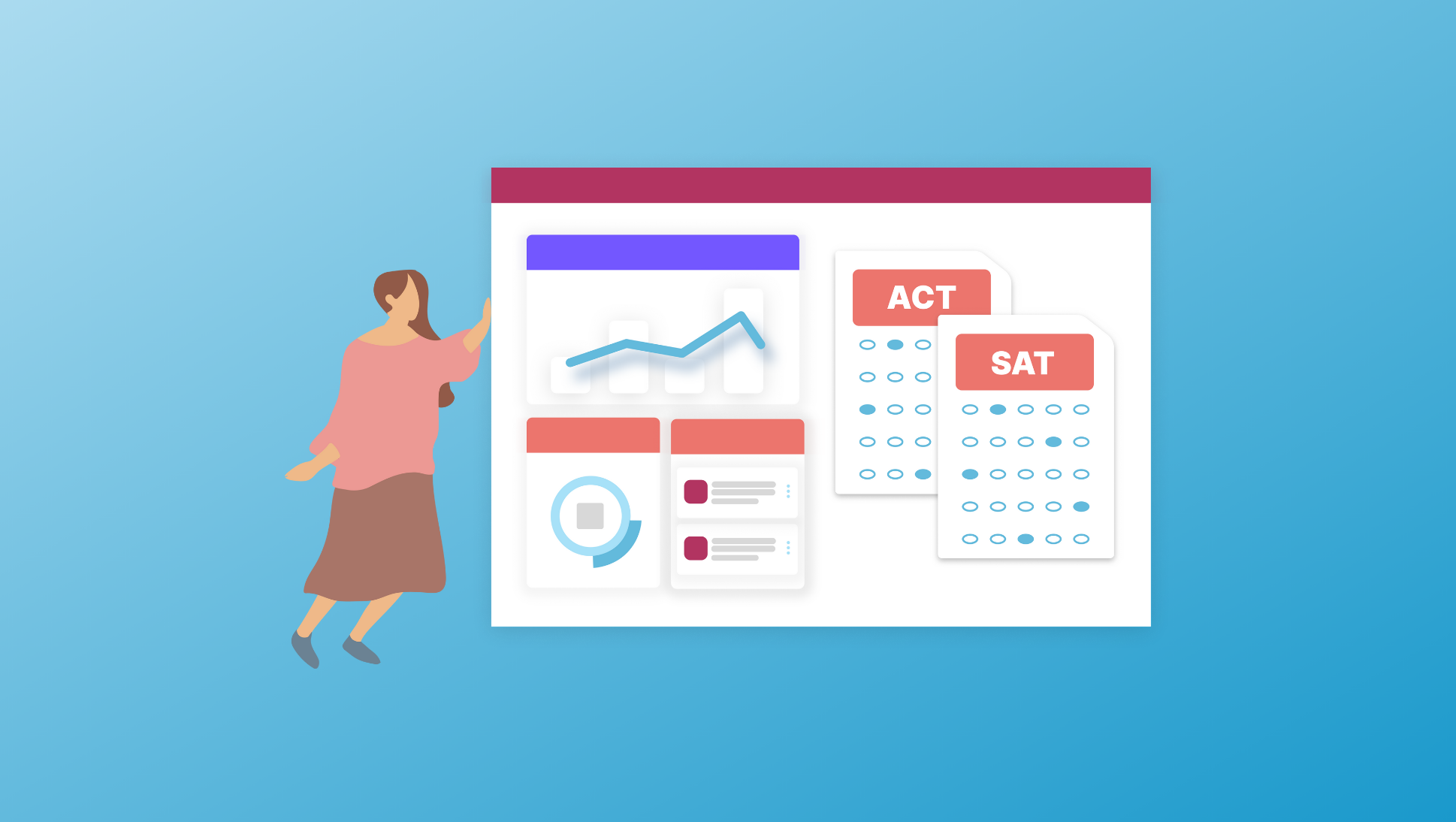4 min read
ACT and SAT Must-Knows for High Schoolers
We recently published a podcast episode on this topic. This blog post provides a recap of what we covered during the episode. Hi! It’s Abby from...
Free for students & their families
Seamlessly integrated, affordable systems for use across your district.
Career Readiness for 6-8 grade, built to guide and track progress in the early years of career exploration.
Scoir + Common App are integrated for the 2025-26 academic year!
Check out content and practical guides to help inform your enrollment strategies and programs.
6 min read
 Julie Kampschroeder
:
September 17, 2025
Julie Kampschroeder
:
September 17, 2025

“Help! My daughter is a junior, and I have no idea what to do. Should she take the SAT? The ACT? How should she prepare? Do we use a tutor? An online class? Which books should we buy? Where do we begin?”
If these questions have been running through your brain (or you're a student yourself), you have come to the right place. This guide is designed to help you understand the different standardized test paths available for your child. To avoid any middle-of-the-night panic attacks, take a deep breath, and relax. We've got you covered.
The first step to the test prep journey is to figure out which test caters to your strengths. Our blog post ACT or SAT? Everything You Need to Know to Choose the Best Test for You can help. But remember, if you or your student scores well enough on one of the practice tests, they may not need to prep much at all! Instead, have them take the next SAT or ACT and see how they do. Although this option is the most cost- and time-effective, it may not be the case for you.
If you or your student could use guidance, review the following and see which might be the best fit.
Typically, you should begin taking standardized tests in your junior year. Please defer to your counselor here; they may have a specific recommendation for you. In general, if you have already taken Algebra 1, Algebra 2, and Geometry, then begin taking tests during September or October of your junior year. However, if you're currently enrolled in these math classes, wait until the winter or spring of your junior year to test; perhaps February would be a good time to take the SAT or ACT.
Depending on how you score on your first round of testing, you may want to consider re-testing during the fall of your senior year. You should plan to sign up for this test by late July or early August. Spend part of your summer break reviewing and studying for your final test to attempt a better score.
Your high school may offer the PSAT and/or the PACT test sophomore year. If so, these preliminary tests will give you a baseline test score. Use your PSAT results to review your weak areas.
If you're still learning about all the different types of standardized tests, check out these articles (written by Test Innovators) for all the basic information you'll need:
After you decide when you'll take your standardized test and whether you'll be taking the ACT and/or SAT, it's time to start preparing. Accessing the official SAT and ACT practice tests is a great place to start.
Step 1: Go to the College Board and view the free SAT practice test, or go to ACT's website and view their free ACT practice tests.
Step 2: Take a full practice test.
Step 3: View your results. Be sure to pay close attention to any questions incorrectly answered.
Step 4: Create a study schedule. Khan Academy will put together a practice schedule for you to take based on the test day when you would like to take the real test. Once you pick a test date, for example, March 7th, Khan Academy will email or text you reminders to take practice tests every two weeks in preparation for the real test. In addition, Khan Academy recommends spending 1.5 to 5 hours a week, or 15 to 60 minutes, five times a week on Khan Academy to work on practice problems and watch videos based on your test results.
Overall, this customized program is an excellent way to keep you on track, assess your weaknesses, take real SAT/ACT practice tests, and work on practice problems. This path does require quite a bit of self-direction, but it can be a great way to save a little money.
While there are many paid online courses in the industry, I suggest you do your homework before signing up for any of them. Some of them are inexpensive and others are upward of $1,000.
Here are some questions to consider:
Also, our partner, Test Innovators, can help! The Test Innovators practice platform has everything you need to reach your target scores, including full-length practice tests, targeted practice exercises, detailed diagnostics, and more. They even have 10 adaptive practice tests for the digital SAT. We recommend giving them a look!
While individual tutoring can be a great option for some students, it is often the most expensive. Before investing potentially thousands of dollars in tutoring for the SAT or ACT, spend some time talking with the company or the tutors to find out their approach. Here are a few questions to help guide your conversation:
Some students benefit greatly from individual tutoring, and it can be a wonderful experience as the best tutors focus on developing the whole student to build confidence and self-awareness through the process. If you plan on taking this route, ask your network for recommendations. Word of mouth is most likely your best option when looking for a strong tutoring company.
Group classes vary wildly in their offerings. Some classes are a boot camp style and take place in a single day over four to eight hours. Many high schools or libraries will offer these types of classes on weekends. While they can be helpful for a general overview of the tests with some generic strategies, they are typically just that—an overview.
For longer group classes or programs, ensure that the classes are separated by score ranges. In addition, if you think that you or your student does not do as well in group or class environments, then it’s most likely best to study individually, either through the online resources mentioned or with a private tutor.
Here are some common FAQs students and families ask about the SAT and ACT.
Never take a national standardized test without reviewing the material! If you attend a Title 1 high school or qualify for free or reduced lunch, you will be eligible for a test fee waiver. This will save you quite a bit of money.
Fee waivers are limited, so use them wisely. If you sign up using a fee waiver and do not take the test, it counts against you. See your counselor for a waiver.
Yes. The Fairtest website lists all colleges that do not require a test for admissions. Some colleges may require a test score for admission into certain majors or for scholarship purposes, which is why we recommend taking the ACT and/or SAT, even if you plan to apply to only test-optional schools.
Be sure to research the colleges on your list for full details and call their admissions office if you need clarification.
Test anxiety is completely normal. This Test Anxiety Battle Guide that Scoir and Test Innovators put together has anxiety-reducing tips!
Most students start prep junior year, after completing Algebra 1, Algebra 2, and Geometry.
Take both practice tests and compare scores. Choose the exam that plays to your strengths.
No. Most of the time, colleges accept both equally.
Use free practice tests, online courses, prep books, tutoring, or group classes depending on budget and learning style.
Tutoring can range from $50–$200 per hour, while online courses or group classes cost less.
Practice under timed conditions, keep a routine, and use relaxation strategies to stay calm.
No. Many schools are test-optional, but ACT and SAT scores may still matter for scholarships or specific majors.
While the world of test prep can often be overwhelming, we are lucky to live in a time with many valuable free resources and quality study materials. To figure out the best approach, consider your budget, your ability, and motivation to study independently.
Want to learn more about the ACT and SAT? Check out this podcast episode for a lot more info.
This article was originally published on January 24, 2018. It was updated on September 17, 2025 for accuracy and comprehensiveness.

Julie Kampschroeder has over three decades of experience working with high school students. She is passionate about assisting first-generation and low-income college-bound students. Julie worked in a diverse high school in St. Louis, Missouri. Early in her career, she volunteered countless hours with the Missouri Association of College Admission Counselors (MOACAC) and earned both the President’s Service Award (2008) and Peggy Clinton Lifetime Service Award (2012). As a first-generation college student herself, growing up in a small town, she is most proud of the National Association of Admissions Counselor Inclusion, Access, and Success Award (2013). Maya Angelo’s motto of “when you know better, you do better” guides her work in educating first-generation students to level the playing field in college admissions.

4 min read
We recently published a podcast episode on this topic. This blog post provides a recap of what we covered during the episode. Hi! It’s Abby from...

6 min read
Gaining admission to the college(s) of your choice might weigh heavily on your mind at the moment. The odds are that the prospect of affording...

8 min read
The Free Application for Federal Student Aid (FAFSA), managed by the Department of Education, is the gateway to federal and state financial aid for...